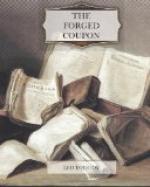Of Tolstoy’s beliefs in regard to the Christian religion it may be said that with advancing years he became more and more disposed to regard religious truth as one continuous stream of spiritual thought flowing through the ages of man’s history, emanating principally from the inspired prophets and seers of Israel, India, and China. Finally, in 1909, in a letter to a friend he summed up his conviction in the following words:—“For me the doctrine of Jesus is simply one of those beautiful religious doctrines which we have received from Egyptian, Jewish, Hindoo, Chinese, and Greek antiquity. The two great principles of Jesus: love of God—in a word absolute perfection—and love of one’s neighbour, that is to say, love of all men without distinction, have been preached by all the sages of the world—Krishna, Buddha, Lao-tse, Confucius, Socrates, Plato, Epictetus, Marcus Aurelius, and among the moderns, Rousseau, Pascal, Kant, Emerson, Channing, and many others. Religious and moral truth is everywhere and always the same. I have no predilection whatever for Christianity. If I have been particularly interested in the doctrine of Jesus it is, firstly, because I was born in that religion and have lived among Christians; secondly, because I have found a great spiritual joy in freeing the doctrine in its purity from the astounding falsifications wrought by the Churches.”
Tolstoy’s life-work was indeed a splendid striving to free truth from falsehood, to simplify the complexities of civilisation and demonstrate their futility. Realists as gifted have come and gone and left but little trace. It is conceivable that the great trilogy of “Anna Karenina,” “War and Peace,” and “Resurrection” may one day be forgotten, but Tolstoy’s teaching stands on firmer foundations, and has stirred the hearts of thousands who are indifferent to the finest display of psychic analysis. He has taught men to venture beyond the limits set by reason, to rise above the actual and to find the meaning of life in love. It was his mission to probe our moral ulcers to the roots and to raise moribund ideals from the dust, breathing his own vitality into them, till they rose before our eyes as living aspirations. The spiritual joy of which he wrote was no rhetorical hyperbole; it was manifest in the man himself, and was the fount of the lofty idealism which made him not only “the Conscience of Russia” but of the civilised world.
Idealism is one of those large abstractions which are invested by various minds with varying shades of meaning, and which find expression in an infinite number of forms. Ideals bred and fostered in the heart of man receive at birth an impress from the life that engenders them, and when that life is tempest-tossed the thought that springs from it must bear a birth-mark of the storm. That birth-mark is stamped on all Tolstoy’s utterances, the simplest and the most metaphysical. But though he did not pass scathless through the purging fires, nor escape with eyes undimmed from the mystic light which flooded his soul, his ideal is not thereby invalidated. It was, he admitted, unattainable, but none the less a state of perfection to which we must continually aspire, undaunted by partial failure.




